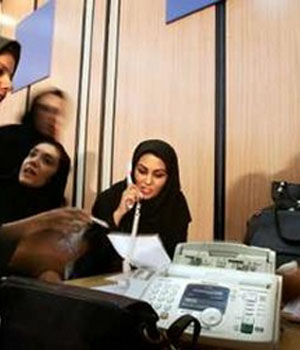
Iranian election officials work at the Interior Ministry’s election headquarters in Tehran June 18, 2005 (REUTERS)
TEHRAN, Iran, AP -Ayatollah Hashemi Rafsanjani, the frontrunner in Iran”s presidential election, failed to win enough votes for an outright victory, forcing the country to schedule its first runoff in history.
With about three-quarters of the ballots counted, Rafsanjani had 21.5 percent after a strong voter turnout that defied a boycott drive by dissidents, according to the state-run media. Iran”s hard-line leaders said President Bush helped fuel the turnout by sharply criticizing the elections as undemocratic and angering many Iranians.
But the race for runner-up was still up for grabs Saturday.
Conservatives were making a strong showing in the partial count. Mahdi Karroubi, the former parliament speaker, held the second spot with 20.2 percent. Karroubi is a close a close ally of Iran”s Supreme Leader Ayatollah Ali Khamenei, who heads the non-elected theocracy that can overrule the president or parliament.
Karroubi was trailed by Tehran”s conservative mayor, Mahmoud Ahmedinejad, with 17.2 percent. The top pro-reform candidate, Mostafa Moin, had fallen to fifth place with 14.3 percent, behind Mohammad Bagher Qalibaf, a former head of the national police, with 15.2 percent.
But the final outcome — expected later Saturday — could significantly reshuffle the race for runner-up. City voters were considered to favor Rafsanjani and Moin, a former culture minister.
What was certain was that a run-off would be needed in Iran”s tightest presidential election since the 1979 Iranian Revolution. An Interior Ministry official involved in the counting told The Associated Press that the vote was too splintered among the seven candidates to give anyone the required 50 percent plus one to win. A second round is planned for next Friday, he said.
Interior Ministry spokesman Johanbakhsh Khanjani announced voter turnout in some provinces had exceeded 80 percent. In others it varied between 65 percent and 80 percent.
Iran has 46.7 million eligible voters, including millions of them living overseas. Votes from the heavier populated regions, such as Tehran with a population of 10.3 million, would be among the last to be tallied.
Rafsanjani, who was president between 1989 and 1997 and was the front-runner throughout the campaign, won his home province of Kerman, taking 45 percent of the vote, provincial election official Rasoul Moazemi told The Associated Press.
But even Rafsanjani”s son Mahdi, who has been working on the campaign, told The AP that his father couldn”t get the 50 percent of the popular vote to avoid a run-off.
During the campaign, the pragmatic Rafsanjani portrayed himself as a steady hand at the helm, able to navigate Iran through the treacherous days ahead, fraught with uncertainty over the nuclear program, relations with the United States and neighboring Iraq.
A day before the election, Bush sharply denounced the vote, saying it was designed to keep power in the hands of the clerics. But some Iranians said they were motivated to vote to retaliate against Bush”s denunciations.
"I picked Ahmadinejad to slap America in the face," said Mahdi Mirmalek after attending Friday prayers at Tehran University.
At Tehran University, the leader of Friday prayers, Ayatollah Mohammad Emami Kashani, told worshippers that voting "strengthens the pillars of the ruling Islamic establishment." Followers then joined in with the common chant of "Death to America!"
The United States accuses Iran of using nuclear technology as a cover to develop atomic arms. Iran denies the claims and insists it aims only for electricity-producing reactors. Iran has suspended uranium-enrichment work during ongoing talks with European envoys to seek a compromise and avoid possible U.N. sanctions.
Iran”s top security official, Hasan Rowhani, told reporters that Iran needs a "powerful and experienced" president to handle nuclear talks — an apparent plug for his ally Rafsanjani.
Iran and the United States have had no diplomatic ties since 1979 when Iranian militants stormed the U.S. Embassy and kept 52 Americans hostage for 444 days.

Iranian President Mohammad Khatami answers a question by a reporter during a visit to the Interior Ministry’s election headquarters in Tehran June 18, 2005, (REUTERS)

An Iranian woman registers before casting her vote at a mosque transferred into a polling station (AFP)
